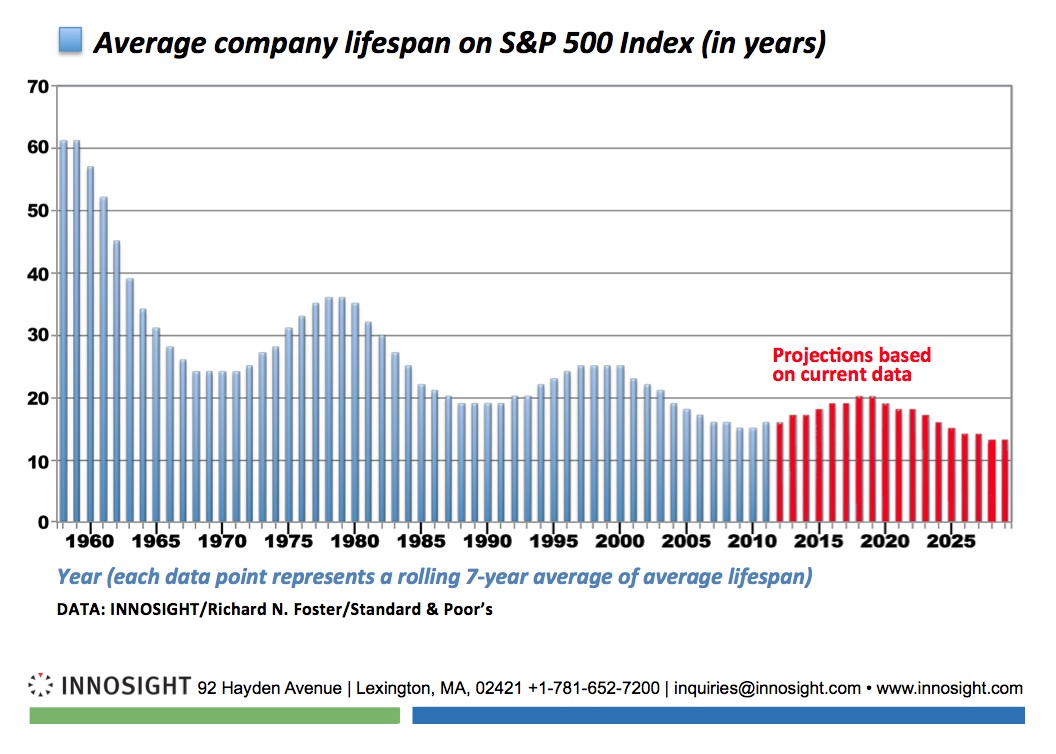Carol Howard Merritt: Five things businesses need to learn from the church
I read the Harvard Business Review. I even follow HBR on Twitter. I regularly quote Daniel Pink. I'm always learning from Anya Kamenetz. And my mind has been blown by the philosophic meanderings of Jaron Lanier. Business, innovation, and technology live alongside theology on my bookshelf. Often businesses have the money to conduct research that churches do not, so we have a lot to learn from them.
But I'm not writing a book on the Gospel According to the Fortune 500 any time soon. Do you know why? Because churches have a much more sustainable business model than businesses do.
I don't mean to sound presumptuous, because I think it's important that we all learn from one another. But if I were in the business world (as I was before I went to seminary), I would spend some time studying churches.
Take a look at this graph. It's data that Richard Foster gleaned from Standard & Poor's. I found it in this downloadable report.

Of course, the point of the graph is how many business stay on the S&P 500. There are many businesses that have dropped off the list and remained viable companies. But not for as long as we might think. According to this article, this average life expectancy of the strongest multi-national corporations is a mere 40 to 50 years.
In comparison, check out this atlas. Go ahead and click on it (although, if you're anything like me, you might have to spend the next hour looking at it). It shows how most of our denominations have been in this country since 1775. We wring our hands because many of our congregations are closing, but denominations will be around for a lot longer than the 239 years that they have thrived. Many of the things that businesses are trying to figure out, we have known all along.
Here are just a few.
- Put resources into innovation. Businesses struggle to keep their core business healthy while creating new ones. If you click on the animated maps from the atlas above, you can see how churches have been planted across the country. Innovation is part of our commission. It come naturally for the church. We are always planting, innovating, and anticipating cultural shifts.
•Think generationally. Though corporations have the structure to last beyond a private business, most of them have not figured out how to serve one generation to the next. They often target one demographic, thereby alienating other demographics. As a result, the strongest, most successful businesses last 40 years-long enough for one generation to consume.
In the Hebrew Bible, we often read, "This is for you, for your children, and for your children's children." The core of our Christian tradition is focused on baptism--which is many things, including a celebration of and covenant to the next generation.
- Change with culture. As Richard Foster has been writing, businesses have had increasing difficulty maintaining new businesses in the midst of rapid change.
We've endured changes in our economy and technology, as well as turbulent social change. In the past, many of our churches have struggled with really important ideas-colonialism, slavery, women's rights, just war theories, white supremacy, and the rights of LGBTQ persons-to name some of the biggest. We have made mistakes. We have endured painful splits. But we have changed with culture-while holding on to our central mission of loving God and loving one another.
- Attract the finest leadership. Whenever there is a frustration that CEOs make so much more than workers, business says that they have to, otherwise there would be no way to attract the best and the brightest leaders. So, even when the business goes down in flames, that Executive is jumping off with his or her golden parachute.
Somehow churches have found the best and the brightest to lead them without an appalling paycheck. As part of the ordination process, we had a psychological exam. They gave us our intelligence scores , but we had to have it on two scales. Why? One was a scale for the average American and the other was for the average pastor. The average pastor's intelligence is higher than the average American's, so it was a much different sort of comparison. Somehow churches have found other ways to attract brilliance-based on passion, community, love and a commitment to something greater than oneself.
- Give back to the community. Businesses have discovered"cause marketing."They realize that if they give back a portion of their profits, then they gain more customer loyalty.
Of course, the healthiest churches do the same things. We care for one another, but we know that our calling is vast and extends beyond our walls. We have started hospitals, universities, homeless shelters, and soup kitchens.
The next time we hear how the church needs to adapt business practices in order to survive, I hope we will know better. Yes, we should learn from business, but there are simply some things in which the church excels.
